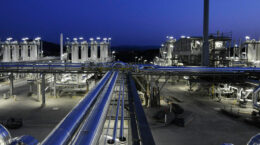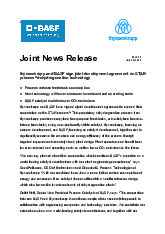thyssenkrupp and BASF sign joint development agreement on STAR process® dehydrogenation technology
- Process reduces feedstock consumption
- New technology will lower customer investment and operating costs
- BASF catalyst enables lower CO2 emissions
thyssenkrupp and BASF have signed a joint development agreement to expand their cooperation on the STAR process®. This proprietary dehydrogenation process from thyssenkrupp produces propylene from propane feedstocks, or iso-butylene from iso-butane feedstocks, using an exceptionally stable catalyst. thyssenkrupp, focusing on process development, and BASF, focusing on catalyst development, together aim to significantly increase the resource and energy efficiency of the process through targeted improvements in catalyst and plant design. Plant operators can benefit from lower investment and operating costs as well as lower CO2 emissions in the future.
“We are very pleased about this cooperation which combines BASF’s expertise as a world-leading catalyst manufacturer with our plant engineering competence,” says Uwe Boltersdorf, Chief Sales Officer of the business unit Chemical & Process Technologies at thyssenkrupp. “With our combined know-how we can further reduce consumption of energy and resources. New catalyst shapes will enable a smaller reformer design, which also lowers the investment costs of dehydrogenation plants.”
Detlef Ruff, Senior Vice President Process Catalysts at BASF, says: “The cooperation between BASF and thyssenkrupp is another example of our successful approach to collaboration with engineering companies and technology providers. We contribute our unique know-how as a world-leading catalyst manufacturer, and together with our partners, drive the implementation of new processes and innovative future technologies.”
“This project is a good example of how technology development can be accelerated through cross-sector collaboration,” says Adrian Steinmetz, Vice President Global Chemical Catalysts & Adsorbents at BASF. “We will specifically address topics like reducing precious metal content. This lowers catalyst costs and additionally reduces feedstock and energy consumption through increased selectivity. This will contribute significantly to a reduction of the CO2 footprint.”
Propylene is one of the largest volume chemicals produced globally with projected further growth. A common use is as raw material for polypropylene, a component that is mainly used in the automotive, textile and packaging industries. Thyssenkrupp’s Steam Active Reforming STAR process® offers an extremely reliable process with a proven plant availability of 98%, which means more than 8,500 hours per year.
Receive up-to-date news releases from BASF via push notification on your smartphone. Register for our news service at basf.com/pushnews.
Kerstin Hoffmann
Media Relations
BASF SE
67056 Ludwigshafen
http://www.basf.com
+49 621 60-29875
Send emailIsabel Reinhardt
External Communications
thyssenkrupp Industrial Solutions AG
45143 Essen
www.thyssenkrupp-industrial-so...
+49 201 844-535472
Send email



